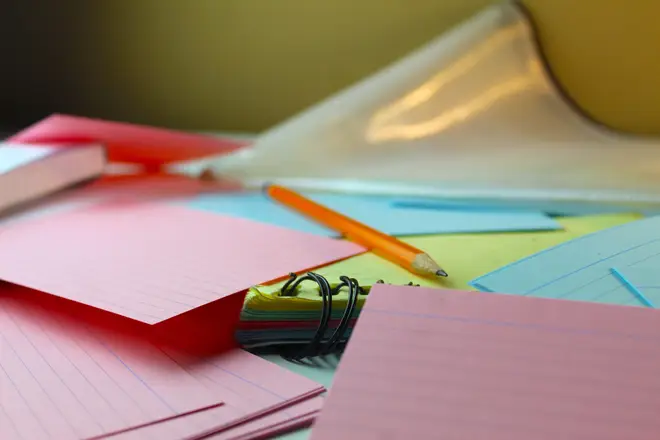On Air Now
Relaxing Evenings with Zeb Soanes 7pm - 10pm
6 April 2024, 19:41 | Updated: 8 April 2024, 10:09

Our top tips to help students in the weeks of revision and exam preparation – complete with a few classical music secret weapons!
As we near exam season, students around the country will be working hard, reading, studying and revising for those upcoming end-of-year assessments.
We know that classical music can play an important part in brain function and general mental and physical health – and at this time of year, we like to lend a hand to all those students hard at work.
This spring, Classic FM is the Nation’s Revision Station. So if you or members of your family are revising, we’re here to help with the best music, a few tips, and supportive company.
Read more: Classical music for studying: the 14 greatest pieces for brain power
Building a study plan will help you focus on what’s important. Wade into your revision without making a plan first, and you risk running out of time or spending too much of your time on one subject.
How you make your plan is up to you. Some students love an elaborate timetable with every hour of every day colour coded, while others might prefer a simpler version with topics allocated to a particular week.
Make sure your plan builds in other time commitments you have and gives you regular breaks from your study. The Student Room has a smart revision planner that automatically schedules your revision and builds in breaks.
The mood, rhythm and texture of classical music is perfect for calming nerves, engaging brains and getting you in a place of focus and productivity.
Composers like Bach, Mozart and Brahms will always help set the mood for a productive study session.
You can find curated revision playlists on Global Player, but most of all, any time of day or night, you can put on Classic FM and always find something uplifting, inspiring and relaxing to help get everyone through revision season.

Lucy plays enchanting Bach prelude in Royal Albert Hall debut at Classic FM Live
We all perform best when we’re feeling good. Make sure your revision area is nice to be in, with good lighting, good positioning and a few things that make it feel like your little sanctuary.
Music can play a role too.
At its heart, much of classical music is about painting a mood or image in music. Think the moonlight of Debussy’s Clair de Lune, the flowing of Johann Strauss II’s Blue Danube, or the relaxing scene of a Beethoven or Mozart Adagio. Through the genius of these compositions, that part of your brain that might be otherwise darting about for distraction is transported to a place of comfort.

Debussy - Clair de Lune on LED piano
Aiming for epic all-day revision sessions might feel smart, but it’s difficult for anyone to maintain focus for this length of time.
Try breaking your revision up into short bursts (maybe 20-25 minutes) and give yourself regular little breaks of five to ten minutes where you can check your phone, have a cup of tea or a quick chat.
You’ll have stacks of different topics to learn for your exams, but rather than taking one and ploughing through it for hours, learn it in short bursts. Even leaving gaps of days between sessions is fine.
This way, your brain has to work to recall what you’re learning in every session and the information is more likely to get stored in your long-term memory. In other words, you’ll be more likely to remember it in the exam.
It’s far more useful to build your revision time around the methods that you find most helpful, rather than getting hung up on the ways other people are doing it.
Think of something in the past that you learned successfully. What techniques did you use? Did you watch instructional videos, make notes or cards or even mind maps? Focusing on how you learn most effectively will really help your revision.
Sometimes you’ll need to match your revision to the exam. For example, it might be more helpful to do practice papers in maths and to make flashcards for history.

Test yourself regularly and do it often. More than anything else, this will expose the things you still need to learn.
Be ruthless with yourself; find the gaps in your knowledge and fill them, using flashcards, multiple choice, short answers – the choice is yours.
Why does testing work? Because it demands that you retrieve information from long-term memory. Pathways in the brain are created that link information and make it easier the next time you need the information.
Testing also teaches you what you know and what you don’t. That means you can restudy the material you were weaker on – plugging the holes in your learning.
You’re not going though this alone and so many of us have felt the pressure of revision and exam seasons in the past. Make sure you keep in touch with those around you – to share how you’re feeling, but also what you’re learning. A conversation about something you’ve just learned is a great way to commit it to memory.
And if you’re one of those supporting a family member in their revision, on Saturdays at 9pm you can join Myleene Klass for Classic Parent Power on Classic FM. The programme is dedicated to parents and families who supporting young students, and what they can do to help.
The mental health charity Young Minds also has some great resources for parents and carers.

Exam questions rarely ask you to simply state what you know, and the few questions that do are never worth many marks. The most marks are given for skills like analysis and application – working out how information links together and applying it to particular questions.
So how do you go further than just memorising?
Try working through past papers and past exam questions. The mark schemes are usually available on the exam board websites so you can check how you did and how you need to improve. You can then try again, armed with that extra knowledge. Watch your marks go up and your confidence build.
Some revision methods are less demanding than others. Highlighting is probably the comfort zone of revision. Buying nice pens and sitting yourself down to cover your notes in fluorescent pink and yellow feels reassuring and not too demanding. But how effective is it? Well, not very – according to research. That isn’t to say that highlighting has no role to play. Use it to identify key terms, names, theories, criticisms and so on and then maybe turn them into flashcards you can test yourself on.
There is also a temptation to keep revising topics you already know. Yes, you do need to check these are still in your mind, but the truth is that you need to spend more time on topics that are more of a struggle.
If revision feels too easy it’s usually because it’s not working.

Yes, revision will take up quite a lot of time in the weeks leading up to exams. But it should never take up all your time. You need to find a balance between studying and normal life. Keep going with sport, playing music, family events and fun social occasions. Have a lie-in when you need to.
Getting this balance right is a massive step towards exam success.
When our brain is engaged, it can sometimes be easy to forget about our body!
Sometimes it’s as simple as taking a pause and a big breath, rolling your shoulders or shaking your arms about. Other times, it might be using your break time to take a walk. Little things to reconnect us with our body can make a big difference to focus and concentration.
This is another area that music can help to unlock. Much of the pulse and pace of classical music is like a human heartbeat, so listen to pieces that you enjoy. Singing and dancing are also a great idea, to help with breath control and movement.
It all comes together to help us stay in the study zone – mind and body.
A well-hydrated brain is your friend at this time, so always have a glass of fresh water at your desk. Herbal teas will also help give mind and body what it needs. Avoid too much coffee or energy drinks, as you want to avoid the peaks and troughs high levels of caffeine and sugar can create.
During both study and exam time, bananas are a fantastic secret weapon. Low in GI, high in nutrients and potassium, they are a perfect snack. Bananas also contain high levels of an amino acid called tryptophan which your body converts into serotonin, the feel-good, brain neurotransmitter. So they make you feel great too.

There are lots of communities and forums that will help you find which revision methods are right for you and your subjects.
Exploring practical tips and new ideas will help keep you engaged and supported throughout this time.
Got a question about revision? Ask The Student Room
Over the coming weeks on Classic FM, we’ll be joined by some Revision Champions to share the music, advice and tips that have helped get them in their study and revision. They are on your side too!
Star singer-songwriter Talia Mar is one of the special guests we’ve welcomed to Classic FM as part of becoming the Nation’s Revision Station. A classically trained singer, who’s hugely passionate about all music, she shares her five favourite pieces of classical music to revise to.
You can hear more from Talia, and her classical music revision picks, this Saturday night on Classic Parent Power with Myleene Klass, and on Relaxing Evenings with Zeb Soanes.

Talia Mar’s favourite classical music for revision